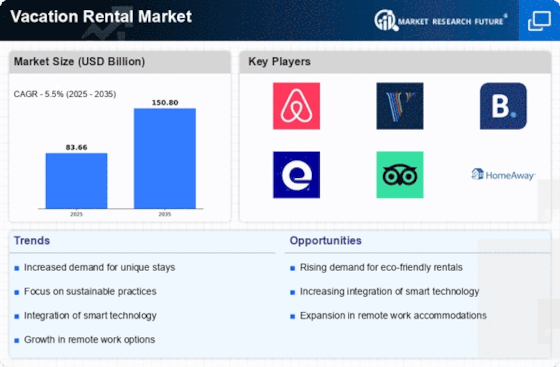- Vacation Rental Market By Property Type (USD Billion, 2019-2035)
- House
- Apartment
- Villa
- Cabin
- Condominium
- Vacation Rental Market By Booking Platform (USD Billion, 2019-2035)
- Online Travel Agencies
- Direct Booking Websites
- Property Management Systems
- Mobile Apps
- Vacation Rental Market By Customer Type (USD Billion, 2019-2035)
- Leisure Travelers
- Business Travelers
- Family Groups
- Couples
- Vacation Rental Market By Duration of Stay (USD Billion, 2019-2035)
- Short-term
- Mid-term
- Long-term
- Vacation Rental Market By Regional (USD Billion, 2019-2035)
- North America
- Europe
- South America
- Asia Pacific
- Middle East and Africa
North America Outlook (USD Billion, 2019-2035)
North America Vacation Rental Market by Property Type
House
Apartment
Villa
Cabin
Condominium
North America Vacation Rental Market by Booking Platform Type
Online Travel Agencies
Direct Booking Websites
Property Management Systems
Mobile Apps
North America Vacation Rental Market by Customer Type
Leisure Travelers
Business Travelers
Family Groups
Couples
North America Vacation Rental Market by Duration of Stay Type
Short-term
Mid-term
Long-term
North America Vacation Rental Market by Regional Type
US
Canada
US Outlook (USD Billion, 2019-2035)
US Vacation Rental Market by Property Type
House
Apartment
Villa
Cabin
Condominium
US Vacation Rental Market by Booking Platform Type
Online Travel Agencies
Direct Booking Websites
Property Management Systems
Mobile Apps
US Vacation Rental Market by Customer Type
Leisure Travelers
Business Travelers
Family Groups
Couples
US Vacation Rental Market by Duration of Stay Type
Short-term
Mid-term
Long-term
CANADA Outlook (USD Billion, 2019-2035)
CANADA Vacation Rental Market by Property Type
House
Apartment
Villa
Cabin
Condominium
CANADA Vacation Rental Market by Booking Platform Type
Online Travel Agencies
Direct Booking Websites
Property Management Systems
Mobile Apps
CANADA Vacation Rental Market by Customer Type
Leisure Travelers
Business Travelers
Family Groups
Couples
CANADA Vacation Rental Market by Duration of Stay Type
Short-term
Mid-term
Long-term
Europe Outlook (USD Billion, 2019-2035)
Europe Vacation Rental Market by Property Type
House
Apartment
Villa
Cabin
Condominium
Europe Vacation Rental Market by Booking Platform Type
Online Travel Agencies
Direct Booking Websites
Property Management Systems
Mobile Apps
Europe Vacation Rental Market by Customer Type
Leisure Travelers
Business Travelers
Family Groups
Couples
Europe Vacation Rental Market by Duration of Stay Type
Short-term
Mid-term
Long-term
Europe Vacation Rental Market by Regional Type
Germany
UK
France
Russia
Italy
Spain
Rest of Europe
GERMANY Outlook (USD Billion, 2019-2035)
GERMANY Vacation Rental Market by Property Type
House
Apartment
Villa
Cabin
Condominium
GERMANY Vacation Rental Market by Booking Platform Type
Online Travel Agencies
Direct Booking Websites
Property Management Systems
Mobile Apps
GERMANY Vacation Rental Market by Customer Type
Leisure Travelers
Business Travelers
Family Groups
Couples
GERMANY Vacation Rental Market by Duration of Stay Type
Short-term
Mid-term
Long-term
UK Outlook (USD Billion, 2019-2035)
UK Vacation Rental Market by Property Type
House
Apartment
Villa
Cabin
Condominium
UK Vacation Rental Market by Booking Platform Type
Online Travel Agencies
Direct Booking Websites
Property Management Systems
Mobile Apps
UK Vacation Rental Market by Customer Type
Leisure Travelers
Business Travelers
Family Groups
Couples
UK Vacation Rental Market by Duration of Stay Type
Short-term
Mid-term
Long-term
FRANCE Outlook (USD Billion, 2019-2035)
FRANCE Vacation Rental Market by Property Type
House
Apartment
Villa
Cabin
Condominium
FRANCE Vacation Rental Market by Booking Platform Type
Online Travel Agencies
Direct Booking Websites
Property Management Systems
Mobile Apps
FRANCE Vacation Rental Market by Customer Type
Leisure Travelers
Business Travelers
Family Groups
Couples
FRANCE Vacation Rental Market by Duration of Stay Type
Short-term
Mid-term
Long-term
RUSSIA Outlook (USD Billion, 2019-2035)
RUSSIA Vacation Rental Market by Property Type
House
Apartment
Villa
Cabin
Condominium
RUSSIA Vacation Rental Market by Booking Platform Type
Online Travel Agencies
Direct Booking Websites
Property Management Systems
Mobile Apps
RUSSIA Vacation Rental Market by Customer Type
Leisure Travelers
Business Travelers
Family Groups
Couples
RUSSIA Vacation Rental Market by Duration of Stay Type
Short-term
Mid-term
Long-term
ITALY Outlook (USD Billion, 2019-2035)
ITALY Vacation Rental Market by Property Type
House
Apartment
Villa
Cabin
Condominium
ITALY Vacation Rental Market by Booking Platform Type
Online Travel Agencies
Direct Booking Websites
Property Management Systems
Mobile Apps
ITALY Vacation Rental Market by Customer Type
Leisure Travelers
Business Travelers
Family Groups
Couples
ITALY Vacation Rental Market by Duration of Stay Type
Short-term
Mid-term
Long-term
SPAIN Outlook (USD Billion, 2019-2035)
SPAIN Vacation Rental Market by Property Type
House
Apartment
Villa
Cabin
Condominium
SPAIN Vacation Rental Market by Booking Platform Type
Online Travel Agencies
Direct Booking Websites
Property Management Systems
Mobile Apps
SPAIN Vacation Rental Market by Customer Type
Leisure Travelers
Business Travelers
Family Groups
Couples
SPAIN Vacation Rental Market by Duration of Stay Type
Short-term
Mid-term
Long-term
REST OF EUROPE Outlook (USD Billion, 2019-2035)
REST OF EUROPE Vacation Rental Market by Property Type
House
Apartment
Villa
Cabin
Condominium
REST OF EUROPE Vacation Rental Market by Booking Platform Type
Online Travel Agencies
Direct Booking Websites
Property Management Systems
Mobile Apps
REST OF EUROPE Vacation Rental Market by Customer Type
Leisure Travelers
Business Travelers
Family Groups
Couples
REST OF EUROPE Vacation Rental Market by Duration of Stay Type
Short-term
Mid-term
Long-term
APAC Outlook (USD Billion, 2019-2035)
APAC Vacation Rental Market by Property Type
House
Apartment
Villa
Cabin
Condominium
APAC Vacation Rental Market by Booking Platform Type
Online Travel Agencies
Direct Booking Websites
Property Management Systems
Mobile Apps
APAC Vacation Rental Market by Customer Type
Leisure Travelers
Business Travelers
Family Groups
Couples
APAC Vacation Rental Market by Duration of Stay Type
Short-term
Mid-term
Long-term
APAC Vacation Rental Market by Regional Type
China
India
Japan
South Korea
Malaysia
Thailand
Indonesia
Rest of APAC
CHINA Outlook (USD Billion, 2019-2035)
CHINA Vacation Rental Market by Property Type
House
Apartment
Villa
Cabin
Condominium
CHINA Vacation Rental Market by Booking Platform Type
Online Travel Agencies
Direct Booking Websites
Property Management Systems
Mobile Apps
CHINA Vacation Rental Market by Customer Type
Leisure Travelers
Business Travelers
Family Groups
Couples
CHINA Vacation Rental Market by Duration of Stay Type
Short-term
Mid-term
Long-term
INDIA Outlook (USD Billion, 2019-2035)
INDIA Vacation Rental Market by Property Type
House
Apartment
Villa
Cabin
Condominium
INDIA Vacation Rental Market by Booking Platform Type
Online Travel Agencies
Direct Booking Websites
Property Management Systems
Mobile Apps
INDIA Vacation Rental Market by Customer Type
Leisure Travelers
Business Travelers
Family Groups
Couples
INDIA Vacation Rental Market by Duration of Stay Type
Short-term
Mid-term
Long-term
JAPAN Outlook (USD Billion, 2019-2035)
JAPAN Vacation Rental Market by Property Type
House
Apartment
Villa
Cabin
Condominium
JAPAN Vacation Rental Market by Booking Platform Type
Online Travel Agencies
Direct Booking Websites
Property Management Systems
Mobile Apps
JAPAN Vacation Rental Market by Customer Type
Leisure Travelers
Business Travelers
Family Groups
Couples
JAPAN Vacation Rental Market by Duration of Stay Type
Short-term
Mid-term
Long-term
SOUTH KOREA Outlook (USD Billion, 2019-2035)
SOUTH KOREA Vacation Rental Market by Property Type
House
Apartment
Villa
Cabin
Condominium
SOUTH KOREA Vacation Rental Market by Booking Platform Type
Online Travel Agencies
Direct Booking Websites
Property Management Systems
Mobile Apps
SOUTH KOREA Vacation Rental Market by Customer Type
Leisure Travelers
Business Travelers
Family Groups
Couples
SOUTH KOREA Vacation Rental Market by Duration of Stay Type
Short-term
Mid-term
Long-term
MALAYSIA Outlook (USD Billion, 2019-2035)
MALAYSIA Vacation Rental Market by Property Type
House
Apartment
Villa
Cabin
Condominium
MALAYSIA Vacation Rental Market by Booking Platform Type
Online Travel Agencies
Direct Booking Websites
Property Management Systems
Mobile Apps
MALAYSIA Vacation Rental Market by Customer Type
Leisure Travelers
Business Travelers
Family Groups
Couples
MALAYSIA Vacation Rental Market by Duration of Stay Type
Short-term
Mid-term
Long-term
THAILAND Outlook (USD Billion, 2019-2035)
THAILAND Vacation Rental Market by Property Type
House
Apartment
Villa
Cabin
Condominium
THAILAND Vacation Rental Market by Booking Platform Type
Online Travel Agencies
Direct Booking Websites
Property Management Systems
Mobile Apps
THAILAND Vacation Rental Market by Customer Type
Leisure Travelers
Business Travelers
Family Groups
Couples
THAILAND Vacation Rental Market by Duration of Stay Type
Short-term
Mid-term
Long-term
INDONESIA Outlook (USD Billion, 2019-2035)
INDONESIA Vacation Rental Market by Property Type
House
Apartment
Villa
Cabin
Condominium
INDONESIA Vacation Rental Market by Booking Platform Type
Online Travel Agencies
Direct Booking Websites
Property Management Systems
Mobile Apps
INDONESIA Vacation Rental Market by Customer Type
Leisure Travelers
Business Travelers
Family Groups
Couples
INDONESIA Vacation Rental Market by Duration of Stay Type
Short-term
Mid-term
Long-term
REST OF APAC Outlook (USD Billion, 2019-2035)
REST OF APAC Vacation Rental Market by Property Type
House
Apartment
Villa
Cabin
Condominium
REST OF APAC Vacation Rental Market by Booking Platform Type
Online Travel Agencies
Direct Booking Websites
Property Management Systems
Mobile Apps
REST OF APAC Vacation Rental Market by Customer Type
Leisure Travelers
Business Travelers
Family Groups
Couples
REST OF APAC Vacation Rental Market by Duration of Stay Type
Short-term
Mid-term
Long-term
South America Outlook (USD Billion, 2019-2035)
South America Vacation Rental Market by Property Type
House
Apartment
Villa
Cabin
Condominium
South America Vacation Rental Market by Booking Platform Type
Online Travel Agencies
Direct Booking Websites
Property Management Systems
Mobile Apps
South America Vacation Rental Market by Customer Type
Leisure Travelers
Business Travelers
Family Groups
Couples
South America Vacation Rental Market by Duration of Stay Type
Short-term
Mid-term
Long-term
South America Vacation Rental Market by Regional Type
Brazil
Mexico
Argentina
Rest of South America
BRAZIL Outlook (USD Billion, 2019-2035)
BRAZIL Vacation Rental Market by Property Type
House
Apartment
Villa
Cabin
Condominium
BRAZIL Vacation Rental Market by Booking Platform Type
Online Travel Agencies
Direct Booking Websites
Property Management Systems
Mobile Apps
BRAZIL Vacation Rental Market by Customer Type
Leisure Travelers
Business Travelers
Family Groups
Couples
BRAZIL Vacation Rental Market by Duration of Stay Type
Short-term
Mid-term
Long-term
MEXICO Outlook (USD Billion, 2019-2035)
MEXICO Vacation Rental Market by Property Type
House
Apartment
Villa
Cabin
Condominium
MEXICO Vacation Rental Market by Booking Platform Type
Online Travel Agencies
Direct Booking Websites
Property Management Systems
Mobile Apps
MEXICO Vacation Rental Market by Customer Type
Leisure Travelers
Business Travelers
Family Groups
Couples
MEXICO Vacation Rental Market by Duration of Stay Type
Short-term
Mid-term
Long-term
ARGENTINA Outlook (USD Billion, 2019-2035)
ARGENTINA Vacation Rental Market by Property Type
House
Apartment
Villa
Cabin
Condominium
ARGENTINA Vacation Rental Market by Booking Platform Type
Online Travel Agencies
Direct Booking Websites
Property Management Systems
Mobile Apps
ARGENTINA Vacation Rental Market by Customer Type
Leisure Travelers
Business Travelers
Family Groups
Couples
ARGENTINA Vacation Rental Market by Duration of Stay Type
Short-term
Mid-term
Long-term
REST OF SOUTH AMERICA Outlook (USD Billion, 2019-2035)
REST OF SOUTH AMERICA Vacation Rental Market by Property Type
House
Apartment
Villa
Cabin
Condominium
REST OF SOUTH AMERICA Vacation Rental Market by Booking Platform Type
Online Travel Agencies
Direct Booking Websites
Property Management Systems
Mobile Apps
REST OF SOUTH AMERICA Vacation Rental Market by Customer Type
Leisure Travelers
Business Travelers
Family Groups
Couples
REST OF SOUTH AMERICA Vacation Rental Market by Duration of Stay Type
Short-term
Mid-term
Long-term
MEA Outlook (USD Billion, 2019-2035)
MEA Vacation Rental Market by Property Type
House
Apartment
Villa
Cabin
Condominium
MEA Vacation Rental Market by Booking Platform Type
Online Travel Agencies
Direct Booking Websites
Property Management Systems
Mobile Apps
MEA Vacation Rental Market by Customer Type
Leisure Travelers
Business Travelers
Family Groups
Couples
MEA Vacation Rental Market by Duration of Stay Type
Short-term
Mid-term
Long-term
MEA Vacation Rental Market by Regional Type
GCC Countries
South Africa
Rest of MEA
GCC COUNTRIES Outlook (USD Billion, 2019-2035)
GCC COUNTRIES Vacation Rental Market by Property Type
House
Apartment
Villa
Cabin
Condominium
GCC COUNTRIES Vacation Rental Market by Booking Platform Type
Online Travel Agencies
Direct Booking Websites
Property Management Systems
Mobile Apps
GCC COUNTRIES Vacation Rental Market by Customer Type
Leisure Travelers
Business Travelers
Family Groups
Couples
GCC COUNTRIES Vacation Rental Market by Duration of Stay Type
Short-term
Mid-term
Long-term
SOUTH AFRICA Outlook (USD Billion, 2019-2035)
SOUTH AFRICA Vacation Rental Market by Property Type
House
Apartment
Villa
Cabin
Condominium
SOUTH AFRICA Vacation Rental Market by Booking Platform Type
Online Travel Agencies
Direct Booking Websites
Property Management Systems
Mobile Apps
SOUTH AFRICA Vacation Rental Market by Customer Type
Leisure Travelers
Business Travelers
Family Groups
Couples
SOUTH AFRICA Vacation Rental Market by Duration of Stay Type
Short-term
Mid-term
Long-term
REST OF MEA Outlook (USD Billion, 2019-2035)
REST OF MEA Vacation Rental Market by Property Type
House
Apartment
Villa
Cabin
Condominium
REST OF MEA Vacation Rental Market by Booking Platform Type
Online Travel Agencies
Direct Booking Websites
Property Management Systems
Mobile Apps
REST OF MEA Vacation Rental Market by Customer Type
Leisure Travelers
Business Travelers
Family Groups
Couples
REST OF MEA Vacation Rental Market by Duration of Stay Type
Short-term
Mid-term
Long-term


















Leave a Comment